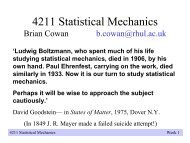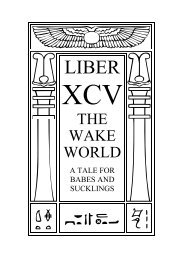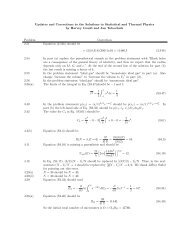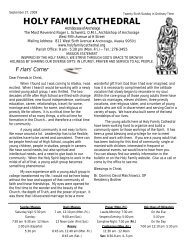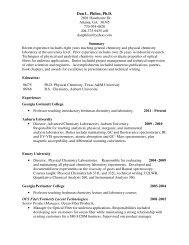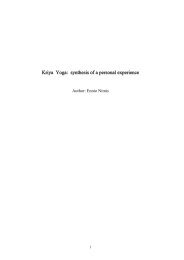Manifesto of the Communist Party - WebRing
Manifesto of the Communist Party - WebRing
Manifesto of the Communist Party - WebRing
Create successful ePaper yourself
Turn your PDF publications into a flip-book with our unique Google optimized e-Paper software.
Since <strong>the</strong> above was written,[22] a new German edition <strong>of</strong> <strong>the</strong> <strong>Manifesto</strong> has again become<br />
necessary, and much has also happened to <strong>the</strong> <strong>Manifesto</strong> which should be recorded here.<br />
A second Russian translation -- by Vera Zasulich -- appeared at Geneva in 1882; <strong>the</strong> preface to<br />
that edition was written by Marx and myself. Unfortunately, <strong>the</strong> original German manuscript has<br />
gone astray; I must <strong>the</strong>refore retranslate from <strong>the</strong> Russian, which will in no way improve <strong>the</strong><br />
text.[23] It reads:<br />
"The first Russian edition <strong>of</strong> <strong>the</strong> <strong>Manifesto</strong> <strong>of</strong> <strong>the</strong> <strong>Communist</strong> <strong>Party</strong>, translated by Bakunin, was<br />
published early in <strong>the</strong> sixties by <strong>the</strong> printing <strong>of</strong>fice <strong>of</strong> <strong>the</strong> Kolokol. Then <strong>the</strong> West could see in it<br />
(<strong>the</strong> Russian edition <strong>of</strong> <strong>the</strong> <strong>Manifesto</strong>) only a literary curiosity. Such a view would be impossible<br />
today.<br />
"What a limited field <strong>the</strong> proletarian movement still occupied at that time (December 1847) is<br />
most clearly shown by <strong>the</strong> last section <strong>of</strong> <strong>the</strong> <strong>Manifesto</strong>: <strong>the</strong> position <strong>of</strong> <strong>the</strong> <strong>Communist</strong>s in relation<br />
to <strong>the</strong> various opposition parties in <strong>the</strong> various countries. Precisely Russia and <strong>the</strong> United States<br />
are<br />
missing here. It was <strong>the</strong> time when Russia constituted <strong>the</strong> last great reserve <strong>of</strong> all European<br />
reaction, when <strong>the</strong> United States absorbed <strong>the</strong> surplus proletarian forces <strong>of</strong> Europe through<br />
immigration. Both countries provided Europe with raw materials and were at <strong>the</strong> same time<br />
markets for <strong>the</strong> sale <strong>of</strong> its industrial products. At that time both were, <strong>the</strong>re fore, in one way or<br />
ano<strong>the</strong>r, pillars <strong>of</strong> <strong>the</strong> existing European order.<br />
"How very different today! Precisely European immigration fitted North America for a gigantic<br />
agricultural production, whose competition is shaking <strong>the</strong> very foundations <strong>of</strong> European landed<br />
property -- large and small. In addition it enabled <strong>the</strong> United States to exploit its tremendous<br />
industrial resources with an energy and on a scale that must shortly break <strong>the</strong> industrial monopoly<br />
<strong>of</strong> Western Europe, and especially <strong>of</strong> England, existing up to now. Both circumstances react in<br />
revolutionary manner upon America itself. Step by step <strong>the</strong> small and middle land ownership <strong>of</strong><br />
<strong>the</strong> farmers, <strong>the</strong> basis <strong>of</strong> <strong>the</strong> whole political constitution, is succumbing to <strong>the</strong> competition <strong>of</strong> giant<br />
farms; simultaneously, a mass proletariat and a fabulous concentration <strong>of</strong> capital are developing<br />
for <strong>the</strong> first time in <strong>the</strong> industrial regions.<br />
"And now Russia! During <strong>the</strong> Revolution <strong>of</strong> 1848-49 not only <strong>the</strong> European princes, but <strong>the</strong><br />
European bourgeois as well, found <strong>the</strong>ir only salvation from <strong>the</strong> proletariat, just be ginning to<br />
awaken, in Russian intervention. The tsar was proclaimed <strong>the</strong> chief <strong>of</strong> European reaction. Today<br />
he is a prisoner <strong>of</strong> war <strong>of</strong> <strong>the</strong> revolution, in Gatchina, and Russia forms <strong>the</strong> vanguard <strong>of</strong><br />
revolutionary action in Europe.<br />
"The <strong>Communist</strong> <strong>Manifesto</strong> had as its object <strong>the</strong> proclamation <strong>of</strong> <strong>the</strong> inevitably impending<br />
dissolution <strong>of</strong> modern bourgeois property. But in Russia we find, face to face with<br />
page 18<br />
page 17



